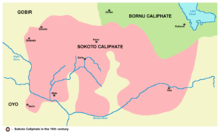Sokoto Caliphate
The Sokoto Caliphate ( Soccatu , Sakatu ), also Empire of Sokoto (on Yoruba Ile Kálìfù Sokoto ) or Fulani Empire called, was an Islamic state of the Fulani in the north of present-day Nigeria , the 1804 by Usman dan Fodio was founded, the largest Part of the Hausa country and with an area of about 440,000 km² was one of the largest pre-colonial states on the African continent . It bordered the Sahara to the north , Kanem-Bornu to the east, Gando to the west and the Yoruba country (now southern Nigeria ) to the south .
history
Usman dan Fodio, a Muslim pullo (singular form of Fulbe) from the Hausa state of Gobir , proclaimed jihad against the rulers of Gobir, who wanted to stop his missionary activities and sent him and his family into exile. In this war, which lasted from 1804 to 1810, dan Fodio defeated the army of the Hausa king with his followers, Fulbe and the Hausa who had converted to Islam. After declaring himself a sheikh after his victory , he subjugated the other principalities of Hausa, Katsina , Zaria , Nupe and Birmin Kebbi . Kanem-Bornu, on the other hand, was able to withstand expansion. Usman's subordinate Modibo Adama founded Adamaua , a Fulbe emirate under the suzerainty of Sokoto.
In 1812 Usman dan Fodio divided the empire in two. His brother Abdullahi received the western provinces with Gwandu , his son Muhammad Bello the eastern provinces with the city of Sokoto, which he founded . Muhammad Bello, who was made his successor after Uthman's death in 1817, had the chronicles of his predecessors, the Hausa kings, destroyed. These chronicles were almost the only written documents of African history written by Africans. Bello's sister Nana Asma'u wrote numerous literary and historical works.
In 1903 Sokoto was defeated by the British under Frederick Lugard . The Konni region, detached from Sokoto , was added to French West Africa . Although the Sokoto Caliphate no longer exists, today's leaders of Islam in Nigeria see themselves as the successors of Fodio.
List of Sultans of Sokoto
- 1804-1817: Usman dan Fodio
- 1817-1837: Muhammad Bello
- 1837–1842: Abu-Bakr Atiku I.
- 1842-1859: Aliyu Babba
- 1859–1866: Ahmad Atiku
- 1866–1867: 'Aliyu Karami
- 1867–1873: Ahmad Rafai
- 1873–1877: Abu-Bakr Atiku II.
- 1877–1881: Mu'azu Ahmad
- 1881–1891: Umar bin Ali
- 1891-1902: 'Abdul-Rahman
- 1902–1903: Muhammad Attahiru I.
- 1903–1915: Muhammad Attahiru II.
- 1915–1924: Muhhammad I. Mai Turare
- 1924-1931: Muhammad II. Tambari
- 1931-1938: Hasan
- 1938–1988: Abu-Bakr
- 1988-1996: Ibrahim Dasuki
- 1996-2006: Ibrahim Muhammad Maccido
- 2006– : Muhammad Sa'ad Abubakar
See also
literature
- Amadou H. Ba , Jacques Daget: L'empire peul du Macina (= Études soudanaises. 3, ZDB -ID 2384211-8 ). Volume 1. Institut Français d'Afrique Noire, Paris 1955.
- Murray Last: The Sokoto Caliphate. Humanities Press, New York NY 1967.
- Murray Last: Sokoto. In: The Encyclopaedia of Islam . Volume 9: San - Sze. New Edition. Brill, Leiden 1997, ISBN 90-04-10413-5 , pp. 711a-712a.
- Stephanie Zehnle: Sex and Jihad. About the victim and perpetrator of West Africa's Islamic concubines. In: Philipp Batelka, Michael Weise, Stephanie Zehnle (eds.): Between perpetrators and victims. Violent relationships and violent communities. Vandenhoeck & Ruprecht, Göttingen 2017, pp. 75–106. ISBN 978-3-525-30099-2 .
Individual evidence
- ↑ cf. Martina Gajdos: Fulfulde. Textbook of a West African language (= Edition Praesens study books . Vol. 11). Edition Praesens, Vienna 2004, ISBN 3-7069-0223-0 .
- ↑ See Last: Sokoto. In: The Encyclopaedia of Islam. Volume 9. New Edition. 1997, pp. 711a-712a, here p. 711b.

